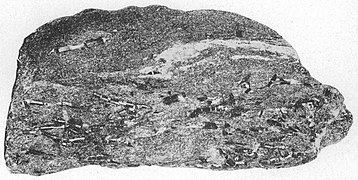Chickies Formation
| Chickies Formation | |
|---|---|
| Stratigraphic range: Cambrian | |
 Chickies Rock (1892) | |
| Type | Metamorphic |
| Sub-units | Hellam Conglomerate Member |
| Lithology | |
| Primary | Quartzite |
| Other | Slate, schist |
| Location | |
| Region | Pennsylvania, New Jersey, Maryland |
| Country | |
| Extent | Mid-Atlantic United States |
| Type section | |
| Named for | Chickies Rock |
| Named by | J. Peter Lesley |
| Year defined | 1876 |
The Cambrian Chickies Formation is a mapped bedrock unit in Pennsylvania, New Jersey, and Maryland. It is named for Chickies Rock, north of Columbia, Pennsylvania along the Susquehanna River.
Description
[edit]The Chickies Formation is described as a light-gray to white, hard, massive quartzite and quartz schist with thin interbedded dark slate at the top. Included at the base is the Hellam Conglomerate Member. It is a rare metamorphic rock that has fossils; Skolithos is found throughout the formation.[1]
Depositional age
[edit]Relative age dating places the Chickies in the Lower Cambrian Period, deposited between 542 and 520 million years ago (±2 million years).[2]
Economic geology
[edit]The Chickies is quarried as a building stone and for aggregate. The stone used to build the restrooms at Valley Forge National Historical Park is Chickies quartzite.[3]
-
Specimen of Chickies Banded Slate. Shows older folded schistosity parallel to bedding cut by younger cleavage inclined to bedding.
-
Specimen of mica schist from upper beds of Chickies Quartzite. Shows stretched epigenetic tourmaline.
-
Cobble bed in Hellam Conglomerate Member
See also
[edit]References
[edit]- ^ Berg, T.M., Edmunds, W.E., Geyer, A.R. and others, compilers, (1980). Geologic Map of Pennsylvania: Pennsylvania Geologic Survey, Map 1, scale 1:250,000.
- ^ Blackmer, G.C., (2005). Preliminary Bedrock Geologic Map of a Portion of the Wilmington 30- by 60-Minute Quadrangle, Southeastern Pennsylvania. Pennsylvania Geologic Survey, Open-File Report OFBM-05-01.0.
- ^ "Pennsylvania Trail of Geology" (PDF). Archived from the original (PDF) on 2009-03-27.



